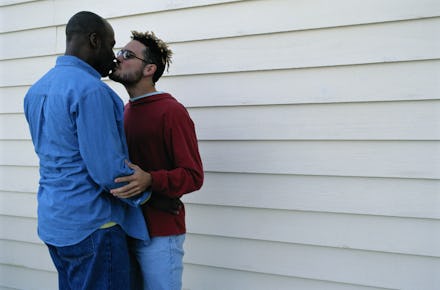Here's How PDA Is Actually Changing the World, One Kiss at a Time

We've all heard arguments against public displays of affection: It's inappropriate, distasteful or even flat-out "gross." Sometimes such sentiments zero in on a certain act (no one wants to see someone's tongue all over someone else's face), but too often the distaste for PDA reflects a discomfort or even aversion to the couples themselves.
A recent study by Harris Poll, commissioned by GLAAD, showed that "a third of non-LGBT Americans (36%) say that just seeing a same-sex couple holding hands makes them uncomfortable."
But that discomfort is exactly the reason PDA is so important — and why it can be a powerful tool to break down societal perceptions.
Discomfort reveals prejudices: The GLAAD-sponsored survey, which polled more than 4,000 heterosexual Americans, pointed out that while "a majority of non-LGBT people may support equal marriage protections for same-sex couples," far fewer are actually comfortable with LGBT people in their daily lives. The survey found that some Americans who supported same-sex marriage still cringed at the sight of same-sex couples holding hands or kissing. Almost 45% of those surveyed said they would be uncomfortable having their child in attendance with them at a same-sex wedding.
An Indiana University study, published in November 2014 in the American Sociological Review, had a similar finding. More than two-thirds of straight respondents supported legal rights for lesbian and gay couples, but only 55% approved of a gay couple kissing on the cheek.
"We come to the conclusion that although heterosexuals may be increasingly willing to grant legal benefits to gay and lesbian couples, entrenched prejudice that takes on subtler forms may remain," said Long Doan, the study's lead researcher.
That entrenched prejudice still sees same-sex affection as unusual at best and immoral at worst, and those views are still not rare in a heterosexist society that until just a few decades ago outlawed same-sex love. The difference is today, that prejudice is often cloaked in the more acceptable veneer of "discomfort." As Frank Bruni worded it in a recent New York Times column, "Do Gays Unsettle You?"
Visibility is power: That's why PDA can make people uncomfortable, but also what gives it its power. Seeing something feared or unknown before your very eyes not only forces you to confront your feelings about it, but can also correct assumptions you might have had.
That's often the case for interracial couples, who may also face judgment for public displays of affection. This can result, as one study found, in interracial couples censoring themselves in front of others, engaging in what sociologists call "stigma management." In fact, embracing PDA and being open is way of fighting those stigmas.
Seeing something around us consistently helps grow familiar with it, then normalize it. As Mic's Ellie Krupnick notes, "Match.com spoke with several mixed-race partners and found that the couples' own families grew more accepting and less prejudiced the more they had regular contact with their children's spouses." Visibility and familiarity matter: In 1987, according to Pew Research data, only 48% of Americans believed interracial dating was acceptable. Fast forward to 2007, when 83% wholeheartedly said interracial dating was acceptable.
The same benefit of visibility can apply to other couples. Take, for example, Shane Burcaw and his girlfriend, Anna Reinalda. Burcaw lives with spinal muscular atrophy and is constantly asked if his girlfriend is his caretaker. As he writes in the Morning Call:
"The mindset that causes a stranger to automatically assume that any female in my presence is a nurse, or family, is one that ignores the reality that people with disabilities can and do have 'normal' romantic relationships. I place normal in quotations because I'm not sure if there is such a thing when it comes to love."
But, Reinalda told BuzzFeed, such mistreatment "most often comes from a genuine lack of understanding, which is entirely valid." By being out in the world and open about their relationship, Burcaw and Reinalda can correct those misperceptions one interaction at a time.
Unnecessarily revolutionary: Certainly "normal" romantic relationships shouldn't be the exclusive purview of able-bodied, straight, cisgender, monogamous couples, nor should those couples be the only ones who get to openly express their love without having judgmental stares cast their way. But these days, since PDA remains a litmus test of a bystander's own prejudices (conscious or unconscious), a simple act of holding hands can feel revolutionary.
Bruni pointed to this double standard in his New York Times column: "A straight woman puts a photograph of herself and her beloved on her desk at work and it's merely décor. A lesbian displays the same kind of picture and it's an act of laudable candor or questionable boldness: A statement, either way you cut it."
Though it shouldn't have to be revolutionary, it's a statement worth making. PDA not only has the power to change minds, it also has benefits for the couple themselves. Research has shown that by becoming "Facebook official" or sharing various photos on social media, couples reflect positively on their relationship status. Those who are able to hold each others' hands during stressful situations find extra comfort. Frequent hugs between partners can even lower blood pressure.
The beauty of PDA is that it's not only good for couples; it can also be good for the people around them. Those who engage in PDA usually aren't doing so to be political – they're just happy. The social change that can follow is an added bonus.